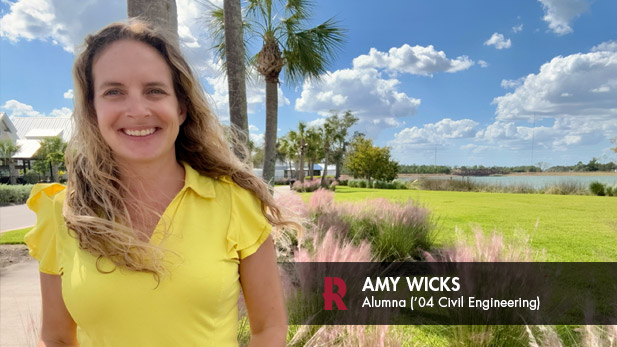Alumna Amy Wicks Paving Sustainable Pathway That’s Defending the Gulf

Sustainable engineer Amy Wicks developed ecological practices that’s accentuating life for America’s first solar-powered town, Babcock Ranch, in Florida. Her work helped the community withstand the wrath of Hurricane Ian.
Amy Wicks is living a sustainable engineer’s dream as the architect of innovative, groundbreaking ecological practices that’s inspiring future city planning to withstand catastrophic weather disasters.
The 2004 civil engineering alumna had a lead role in the development of greenspaces and a sustainable stormwater collection system that’s accentuating life for residents of America’s first solar-powered town, Babcock Ranch, located 12 minutes northeast of Fort Myers, Florida. Behind Wicks’ work, the town withstood the wrath of Hurricane Ian in September of 2022 and is ready for the next storm in Florida’s annual six month-long hurricane season.
Starting with a blank canvass consisting of approximately 18,000 acres former logging and agricultural land, Wicks designed a series of bio-swales, and rain gardens whose soil and native vegetation filter groundwater prior to connecting them with detention ponds and created wetlands to simulate Florida’s natural swamps.
“(Babcock Ranch) gave me a platform to be creative,” said Wicks, who has worked on the community project since 2006. “My whole career has been an adaptation to this new concept—I don’t know anything other than constantly changing, constantly evolving, and looking for new ideas for how to do things.”
Later, she added, “Rose-Hulman really teaches you to think outside the box and problem solve. Its graduates have the ability to create something new, innovative, and change how we live today.”
Wicks’ sustainable plans helped Babcock Ranch come away nearly unscathed when Hurricane Ian brought 21 inches of rain, 150 mph sustained winds, and storm surges up to 18 feet to the area as the community, where she also lives with her husband and three children, passed directly through the storm’s eye. In fact, it was the only housing development in the region that didn’t suffer flooding or electrical outages and had available drinking water throughout the harrowing period when the Fort Myers region was left devastated in the wake of the fierce Category 4 hurricane.
“It was 10 of the most stressful hours of my career,” Wicks recalled. “Because I live at Babcock, I kept looking out my window thinking ‘When am I going to see what I forgot?’ Years of planning and lots of hard work were really put to the test. We had prepared for the worst case. It was a relief more than anything the next morning that everything worked as had been planned.”
Wicks and other members of Babcock Ranch’s planning team consulted maps from the 1940s, before the land was developed, to examine the natural water flows during periods of high rainfall. Some of these flows had been changed over the decades by farming, developments, and other manmade purposes. The community’s houses, golf courses, forest trails, and bicycle paths were situated around strategically placed lakes and other surface water features that absorb excess rainfall, and react with the land both utilizing the natural environment and mimicking it where manmade features exist. Redundancies were built into the system to make sure if one aspect is affected—possibly a downed tree blocks water flow during a hurricane—water is averted to another retention pond or marsh area. Nearby is an 870-acre solar farm with nearly 700,000 solar panels generating 150 megawatts of reliable energy, enough to power nearly 30,000 homes through Florida Power & Light’s electric grid.
It has created a picture postcard community that was the fifth top-selling master planned community in the nation in 2022, according to Real Estate Consulting, and its community sustainable planning techniques has been featured in articles by the Christian Science Monitor, British Broadcasting Corporation, PBS Newshour, NBC’s Today Show, regional and Florida media, and engineering/architectural special-interest publications.
Now, Wicks has taken her passion to create her own company, Wicks Consulting Group, where she is able to pursue similar projects that advance sustainable development, and has been more vocal in her advocacy of implementing the design strategies used in Babcock Ranch throughout Florida to minimize destruction in the wake of climate change.
“Babcock Ranch showcased what could be done. I want more of these projects. They’re important to society in general,” said Wicks, who earned a master’s degree in water resources planning and management with a focus on sustainability. “As an engineer you want to grow and innovate. (After Hurricane Ian) there was almost a sense of loss because nothing had gone wrong, so I couldn’t make it better for next time. Now, I have to make sure we’re more prepared for the next time … My (career) focus has been bringing the civil and environmental environments together so that they coexist in nature. I love exploring beyond where the level of the current understanding of everything is.”
Wicks received the Rose-Hulman Alumni Association’s Career Achievement Award earlier this year and appreciates the close-knit community where professors took special care to ensure students that can apply concepts that will be pivotal to their post-graduate career success.
“You never were just a number at Rose-Hulman. There was always a personal experience here. Everyone here wanted you to be successful and help get you to that point,” she stated. “I found a place (at Rose-Hulman) that I was most comfortable and evolved an interest in surface water systems that would be my eventual career path.”